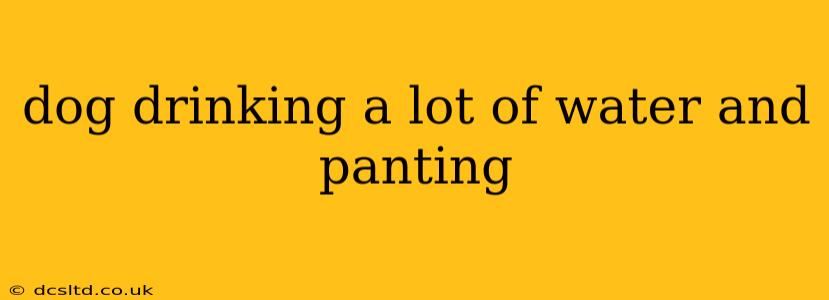Is your dog drinking excessively and panting more than usual? This can be a worrying sign, and it's crucial to understand the underlying causes. While sometimes it's a simple matter of thirst, increased water intake coupled with heavy panting can indicate a more serious health issue. This comprehensive guide explores the possible reasons behind this behavior, offering insights to help you determine when a veterinary visit is necessary.
Why is My Dog Drinking So Much Water and Panting?
Increased thirst (polydipsia) and panting (dyspnea) are often linked. The reasons for this combination can range from benign to serious, requiring prompt veterinary attention in some cases. Let's delve into some of the most common culprits.
Dehydration:
The most straightforward explanation is dehydration. If your dog hasn't had enough water, they'll naturally drink more to compensate. Panting helps them regulate their body temperature and can be a response to dehydration, especially in hot weather or after strenuous activity. Ensure your dog always has access to fresh, clean water.
Exercise and Heat:
Intense exercise or exposure to hot temperatures can lead to both increased thirst and panting. This is a normal physiological response to help regulate body temperature and replenish fluids lost through sweat (evaporation from the tongue and panting). Provide extra water after exercise or hot weather.
Underlying Medical Conditions:
Several medical conditions can manifest as increased thirst and panting. These include:
- Diabetes Mellitus: High blood sugar levels can cause excessive urination (polyuria), leading to dehydration and increased water intake. Panting might be a symptom of the resulting dehydration or hyperglycemia.
- Kidney Disease: Damaged kidneys struggle to concentrate urine, leading to frequent urination and increased thirst. Panting could be related to dehydration or other metabolic imbalances.
- Cushing's Disease: This hormonal disorder results in increased cortisol levels, which can cause increased thirst, urination, and panting.
- Hyperthyroidism: An overactive thyroid gland can also lead to increased metabolism, resulting in greater thirst and panting.
- Infections: Various infections, including urinary tract infections (UTIs) or other systemic infections, can cause increased thirst and panting as the body fights the infection.
Other Potential Causes:
- Medication Side Effects: Some medications can cause increased thirst and urination as side effects.
- Stress or Anxiety: In rare cases, extreme stress or anxiety can lead to increased panting and potentially increased water intake.
- Dental Issues: Painful dental problems can make eating and drinking difficult, leading to infrequent but large water intakes.
How Much Water is Too Much for My Dog?
There's no single answer to this question, as water intake varies significantly depending on factors like breed, size, activity level, and climate. However, a sudden and dramatic increase in water consumption should always raise concern. Observe your dog's normal drinking habits and note any significant changes.
When Should I Take My Dog to the Vet?
If your dog exhibits increased thirst and panting accompanied by any of the following symptoms, seek veterinary attention immediately:
- Lethargy or weakness
- Vomiting or diarrhea
- Weight loss
- Changes in urination frequency or amount
- Increased respiratory rate or difficulty breathing
- Changes in appetite
- Behavioral changes
Is Panting and Excessive Drinking Normal After Surgery?
Post-surgical panting and increased thirst are common. Anesthesia and surgery can dehydrate a dog, causing these symptoms. Follow your vet's instructions carefully regarding post-operative care, including hydration.
Can Anxiety Cause My Dog to Drink More Water?
While less common than medical conditions, significant stress or anxiety can indirectly lead to increased water consumption. If you suspect anxiety, consult your veterinarian who can help determine the cause and recommend appropriate management strategies.
What Happens If My Dog Doesn't Drink Enough Water?
Dehydration can be very serious, especially in dogs. Symptoms range from lethargy and decreased skin elasticity to more severe issues such as organ damage. Ensure your dog always has access to fresh water.
By carefully observing your dog's behavior and noting any accompanying symptoms, you can better understand the underlying cause of increased water intake and panting. Remember, early detection and veterinary intervention are crucial for managing any potential health problems. This information is for general guidance only, and always consult your veterinarian for accurate diagnosis and treatment of your dog's specific needs.
